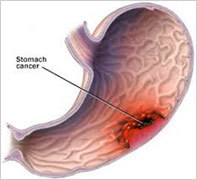
Stomach cancer, or malignant tumors of the lining of the stomach, have seen an overall decrease in recent years, says Dr. Pradeep Jain at Action Cancer Hospital, but researchers nonetheless see over 21,000 new cases and 15,000 deaths per year in the United States alone. There are different types of stomach cancer, which are classified according to the type of tissue in which they originated. Adenocarcinoma is the most prevalent type; this originates in the glandular tissue and accounts for over 90 percent of all stomach cancers. Other types of stomach cancers are lymphomas (involving the lymphatic system) and sarcomas (involving connective tissues like blood vessels, muscle, or fat).

Dr. Pradeep Jain, explains that Early detection is vitally important in stomach cancers, as cure rates are extremely high when these cancers are caught early – but drop dramatically when the cancer is at an advanced stage when found. Stomach cancer, unfortunately, is most frequently not found until it has advanced considerably.
It is usually impossible to pinpoint the exact cause of stomach cancer, but several factors are known to increase the risk. For example, men get more stomach cancers than women, and Asian and African American people have a higher risk than other races. A genetic link is undoubtedly present in many cases, and having a family member with stomach cancer can double or triple your risk. Your age matters, too; the highest-risk age is 70 for men and 74 for women.
Stomach Cancer Treatment By Dr. Pradeep Jain, Action Cancer Hospital, Delhi - Dr. Pradeep Jain is well renowned Gastroenterology surgeon with wide experience in Gastrointestinal and Hepatobiliary Surgery.
Many stomach cancers are probably caused by lifestyle factors like smoking, drinking alcohol heavily, and consuming a diet low in fiber and high in salt (including salt- or nitrate-preserved foods such as smoked meats or other foods high in salt). H. pylori bacteria, the bacteria often blamed for ulcers, is a known risk factor for stomach cancer. Finally, exposure in the workplace to certain agents like asbestos can greatly increase a person’s stomach cancer risk.
Stomach Cancer Treatment By Dr. Pradeep Jain Dr. Pradeep Jain, at Action Cancer Hospital explains that Early detection is vitally important in stomach cancers, as cure rates are extremely high when these cancers are caught early – people should be on the lookout for symptoms and report them at once to their doctors. Early on, there may be no symptoms at all – one of the reasons stomach cancers are so often found late. However, there are some early symptoms that should alert you that something could be wrong, such as indigestion, a bloated feeling after eating, nausea, and loss of appetite. Often people write these symptoms off as acid reflux or simple heartburn rather than seeing their doctors for a proper diagnosis. At this stage, you have the greatest chance of successful treatment, so it’s important to be proactive and make an appointment to see your doctor.